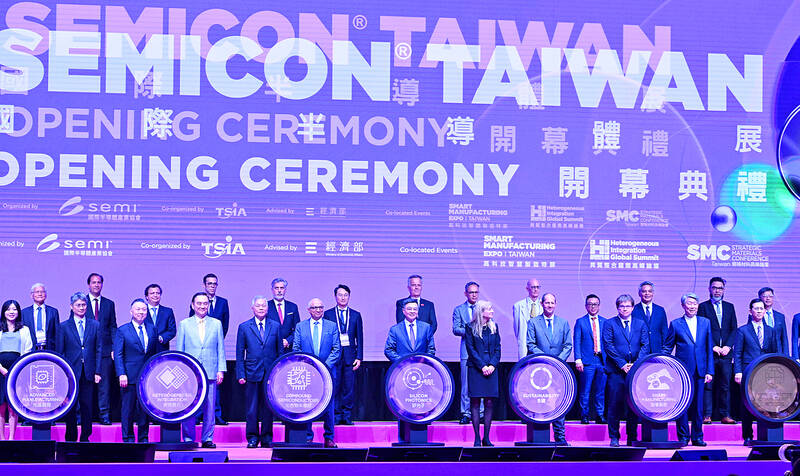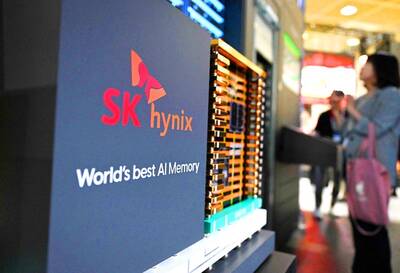Taiwan is expected to play a major role in driving global economic growth through its central position in the integrated circuit (IC) manufacturing sector, semiconductor industry leaders said in Taipei yesterday.
Speaking at the opening ceremony of Semicon Taiwan, SEMI president and chief executive Ajit Manocha said that the industry is “counting on Taiwan to play a big role” in artificial intelligence (AI) that would drive global economic growth.
“AI enabled growth is going to be more than 50 percent of the growth that we are in for next decade,” Manocha told an audience that included Premier Cho Jung-tai (卓榮泰), foreign delegations and SEMI top executives.

Photo: Chang Chia-ming, Taipei Times
SEMI is a US-based association that promotes the global semiconductor industry.
The IC industry alone “ended last year at US$600 billion in revenue, and it took us 70 years to get there, but in the next seven to eight years, it will be US$1 trillion,” Manocha said.
After the next decade of quantum computing, the IC industry might reach US$4 trillion to US$5 trillion by 2050, he said, adding that “Taiwan plays a major role” in all of these high-tech areas.
Photo: I-Hwa Cheng, Bloomberg
Cho also spoke at the ceremony, highlighting “Taiwan’s responsibility” in the global industry.
“Taiwan and its people understand the responsibility we bear in global supply chains, and the Taiwanese government will shoulder the responsibility of making sure to improve the investment and production environments [in the nation],” Cho said.
Meanwhile, Manocha said he does not believe in the end of Moore’s Law, referring to the observation made in 1965 by Intel Corp cofounder Gordon Moore that the number of transistors in an integrated circuit doubles every two years, meaning chips get smaller.
“I think the way AI is coming into the picture, and the advanced packaging, the heterogeneous integration, the chiplets, all of which are only enhancing Moore’s law and the functionality of the chip,” Manocha said. “I think we will continue driving the growth of this industry, and all those activities are happening right here in Taiwan.”
Taiwan Semiconductor Industry Association executive director Nicky Lu (盧超群) echoed Manocha’s optimism, saying that he expects a “golden age” of at least 20 years for the IC industry as the Internet of Things sector continues to grow alongside the global rise of AI and quantum computing.
“Taiwan’s 2024 semiconductor revenue will reach US$160 billion again, more than 25 percent of worldwide revenue,” Lu said. “Mankind is setting up a global zero carbon emission target, demanding research and development breakthroughs, especially in semiconductors.”
To drive these innovations forward, “Taiwan has been working hard and in close collaboration with global partners effectively,” he said.
Lu cited Taiwan Semiconductor Manufacturing Co (台積電) -— which is building fabs in the US, Japan and Germany — as an example of Taiwanese companies expanding their operations overseas.
“ASE Technology Holding Co (日月光投控) is also investing in Malaysia, Mexico and the US, and GlobalWafers Co (環球晶圓) now runs 18 facilities in nine countries,” he said.
Mary Puma, chair of the SEMI international board of directors, said Semicon Taiwan underscores Taiwan’s pivotal role in semiconductor supply chains.
“Given its strategic importance, regional cooperation is becoming increasingly critical, and the exhibition will deepen cross-border exchanges, foster innovation and strengthen partnerships,” she said.
The three-day semiconductor expo runs until tomorrow at the Taipei Nangang Exhibition Center.

Intel Corp chief executive officer Lip-Bu Tan (陳立武) is expected to meet with Taiwanese suppliers next month in conjunction with the opening of the Computex Taipei trade show, supply chain sources said on Monday. The visit, the first for Tan to Taiwan since assuming his new post last month, would be aimed at enhancing Intel’s ties with suppliers in Taiwan as he attempts to help turn around the struggling US chipmaker, the sources said. Tan is to hold a banquet to celebrate Intel’s 40-year presence in Taiwan before Computex opens on May 20 and invite dozens of Taiwanese suppliers to exchange views

Application-specific integrated circuit designer Faraday Technology Corp (智原) yesterday said that although revenue this quarter would decline 30 percent from last quarter, it retained its full-year forecast of revenue growth of 100 percent. The company attributed the quarterly drop to a slowdown in customers’ production of chips using Faraday’s advanced packaging technology. The company is still confident about its revenue growth this year, given its strong “design-win” — or the projects it won to help customers design their chips, Faraday president Steve Wang (王國雍) told an online earnings conference. “The design-win this year is better than we expected. We believe we will win

Power supply and electronic components maker Delta Electronics Inc (台達電) yesterday said it plans to ship its new 1 megawatt charging systems for electric trucks and buses in the first half of next year at the earliest. The new charging piles, which deliver up to 1 megawatt of charging power, are designed for heavy-duty electric vehicles, and support a maximum current of 1,500 amperes and output of 1,250 volts, Delta said in a news release. “If everything goes smoothly, we could begin shipping those new charging systems as early as in the first half of next year,” a company official said. The new

SK Hynix Inc warned of increased volatility in the second half of this year despite resilient demand for artificial intelligence (AI) memory chips from big tech providers, reflecting the uncertainty surrounding US tariffs. The company reported a better-than-projected 158 percent jump in March-quarter operating income, propelled in part by stockpiling ahead of US President Donald Trump’s tariffs. SK Hynix stuck with a forecast for a doubling in demand for the high-bandwidth memory (HBM) essential to Nvidia Corp’s AI accelerators, which in turn drive giant data centers built by the likes of Microsoft Corp and Amazon.com Inc. That SK Hynix is maintaining its